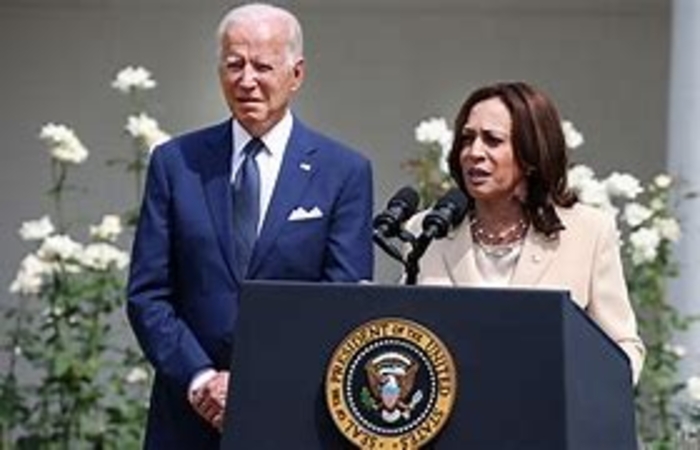
For Immediate Release!
By Andrea Shalal and Douglas Gillison
(Reuters) - The Biden administration on Thursday announced plans to remove medical bills from Americans' credit reports in a push to end what it called coercive debt collection tactics that affect millions of consumers.
Proposals under consideration would help families financially recover from medical crises, stop debt collectors from coercing people into paying bills they may not even owe, and ensure that creditors are not relying on data that is often plagued with inaccuracies and mistakes, Vice President Kamala Harris and Rohit Chopra, the top consumer finance watchdog, announced.
Harris told reporters that more than 100 million Americans had unpaid medical debt.
"Many of the debts people have accrued are due to medical emergencies," she said. "We know credit scores determine whether a person can have economic health and wellbeing, much less the ability to grow their wealth."
Chopra's agency, the Consumer Financial Protection Bureau, reported last year that roughly 20% of Americans have medical debt, but CFPB said its data also showed medical billing data is a poor indicator of whether consumers' are likely to pay down traditional debts.
The Brookings Institution think tank also found big gaps in medical debt statistics, with some 80% of debt held by households with zero or negative net worth, and communities of color hit especially hard. For instance, 27% of Black households hold medical debt compared with 16.8% of non-Black households.
Learn more HERE!:
https://www.usnews.com/news/top-news/artic... ********
FACT SHEET: The Biden Administration Announces New Actions to Lessen the Burden of Medical Debt and Increase Consumer Protection
as part of the fight to help Americans deal with high costs, the Biden-Harris Administration is announcing new actions to protect consumers and lessen the burden of medical debt on American families. Together, these actions will help:
Hold medical providers and debt collectors accountable for harmful practices;
Reduce the role that medical debt plays in determining whether Americans can access credit – which will open up new opportunities for people with medical debt to buy a home or get a small business loan;
Help over half a million of low-income American veterans get their medical debt forgiven; and,
Inform consumers of their rights.
One-in-three adults in the United States have medical debt. It is now the largest source of debt in collections—more than credit cards, utilities, and auto loans combined. Black and Hispanic households are more likely to hold medical debt than white households.
Medical debt is not just a financial issue—it can have negative health effects too. One study found that almost half of individuals with medical debt intentionally avoided seeking care.
Getting sick or taking care of loved ones should not mean financial hardship for American families. That is why the Administration is taking new action to ease the burden of medical debt and protect consumers from predatory collection policies. These actions build upon the President’s April 5th Executive Order on strengthening access to affordable, quality health care coverage, which directed federal agencies to take action to reduce the burden of medical debt.
Today, Vice President Harris is announcing reforms in four areas that will lessen the burden of medical debt, protect consumers, and open up new opportunities for Americans looking to buy a home or start a small business.
Holding Providers and Collectors Accountable
When families cannot afford to pay the cost of care—often because they are uninsured or underinsured—providers have a responsibility to offer non-predatory payment plans or financial assistance to all eligible patients. While many do, far too many eligible patients report not receiving help. Worse, lawsuits against patients over medical bills are on the rise. And when hospitals sell outstanding bills to third party debt collectors, patients can be subjected to persistent and aggressive collections practices.
The federal government pays roughly $1.5 trillion a year into the health care system to provide patients with quality care and services. Providers receiving that funding should make it easy for eligible patients to receive the financial assistance they are entitled to, and should not directly or indirectly subject patients to illegal and harassing debt collection practices.
Today, Secretary Becerra is directing the Department of Health and Human Services (HHS) to evaluate how providers’ billing practices impact access and affordability of care and the accrual of medical debt. HHS will request data from more than 2,000 providers on medical bill collection practices, lawsuits against patients, financial assistance, financial product offerings, and 3rd party contracting or debt buying practices. The Department will, for the first time, weigh this information in their grantmaking decisions, publish topline data and policy recommendations for the public, and share potential violations with the relevant enforcement agencies of jurisdiction.
Separately, the Consumer Financial Protection Bureau (CFPB) will investigate credit reporting companies and debt collectors that violate patients’ and families’ rights, and hold violators accountable. The CFPB has already issued a bulletin to prevent unlawful medical debt collection and reporting. The CFPB will target coercive credit reporting and determine whether unpaid medical billing data should ever be included in credit reports.
Improve Government Underwriting Practices
The latest research finds that owing medical debt is not a reliable predictor of overall financial health. An analysis of 5 million anonymized credit records found that consumers who owed medical debt paid their bills at the same rate as those who did not. In fact, including paid-off medical debt causes credit scores to underestimate creditworthiness by as much as 22 points. As a result, the inclusion of medical debt on credit reports and in credit scores and loan underwriting can hold American’s back from financial opportunities while failing to improve the accuracy and predictiveness of lending programs.
The private sector has taken important steps to address this problem. Last month, the three largest credit reporting agencies—Equifax, Experian, and Transunion—announced that they will no longer include certain forms of medical debt on credit reports, removing billions of dollars in debt from consumer reports. This change covers borrowers with already paid debts, unpaid debts less than a year old, and debts paid or unpaid under $500.
However, this change leaves out a third of Americans with medical debt over $500. For example, 11 million Americans have medical debt above $2000 and 3 million Americans have debt over $10,000. Further action is needed to help families struggling with medical debt.
The Biden-Harris Administration is committed to leading the way. The federal government is one of the largest actors in consumer credit markets, directly providing tens of billions of loans annually to millions of Americans, and guaranteeing or holding up to 70% of all mortgages. Government action matters. Americans with medical debt can apply for an FHA-backed mortgage without fear that medical debt will keep them from being able to buy a home. FHA – which backs over 12 % of new home purchases in America — has eliminated medical debt from consideration when evaluating a borrower’s creditworthiness.
That is why, today, the Administration is announcing actions that go beyond recent private sector announcements.
The Biden-Harris Administration is providing guidance to all agencies to eliminate medical debt as a factor for underwriting in credit programs, whenever possible and consistent with law. Medical debt is not a reliable indicator of credit quality, and its impact should be reduced or eliminated to give more American families the opportunity to thrive:
Americans with medical debt can apply for USDA rural housing service loans without fear that their medical debt could keep them from getting a mortgage. Today, USDA is announcing that it will discontinue the inclusion of any recurring medical debts into borrower repayment calculations, which measure a borrower’s ability to repay for its homeownership programs—over $20 billion in lending activity.
The Department of Veteran Affairs has taken multiple steps to ensure credit reporting and underwriting regarding medical debt, including finalizing a rule to virtually cease reporting of medical debt for veterans with bills from VA Care. VA will also review its underwriting guidelines to ensure we minimize or eliminate medical debt reporting as a proxy for creditworthiness, wherever possible.
The Small Business Administration has a demonstrated commitment to ensuring credit access and a vested interest in accurate credit reporting and underwriting. To further this commitment, SBA will work with its colleagues and partners to lessen the financial burden of medical debt for families and to review SBA lending programs to identify ways to reduce the negative impact of medical debt on small business access to capital.
FHFA is reviewing the credit models that Fannie Mae and Freddie Mac use and looking at ways to ensure that measures of creditworthiness are accurate, reliable, and predictive.
To reinforce these measures, the Office of Management and Budget (OMB) will be issuing new guidance to agencies to, whenever possible and consistent with law, eliminate medical debt as a factor for underwriting in credit programs, or reduce its impact.
Support Veterans in Financial Hardship
Since the start of the pandemic, VA has cancelled or refunded approximately $1 billion in copayments to over 1.5 million veterans. The American Rescue Plan (ARP) eliminated all out-of-pocket medical cost for veterans enrolled in VA health care and provided much needed financial relief to veterans experiencing economic hardship during the COVID-19 pandemic.
Veterans Affairs (VA) will now make it easier and faster for lower-income veterans to get their VA medical debt forgiven. Currently, veterans in financial hardship who need medical debt relief from VA must fill out a complex, paper form with complicated eligibility requirements. The application process is confusing, time-consuming, and as a result, veterans may be deterred from applying for much-needed relief. To address these problems and ensure that veterans get the relief they deserve, VA will streamline the request process, including offering an online option to apply, and set a simple income threshold to qualify for relief.
VA has also published a final rule
https://news.va.gov/press-room/va-establis... under which it will virtually cease reporting unfavorable debt, including medical debt, to consumer reporting agencies. The new rule ensures that debt reported better reflects creditworthiness, while saving veterans from further financial struggles simply because they had to take on medical debt.
Read and learn more HERE!:
https://www.whitehouse.gov/briefing-room/s...
 Posted By: agnes levine
Posted By: agnes levine
Friday, September 22nd 2023 at 10:40AM
You can also
click
here to view all posts by this author...